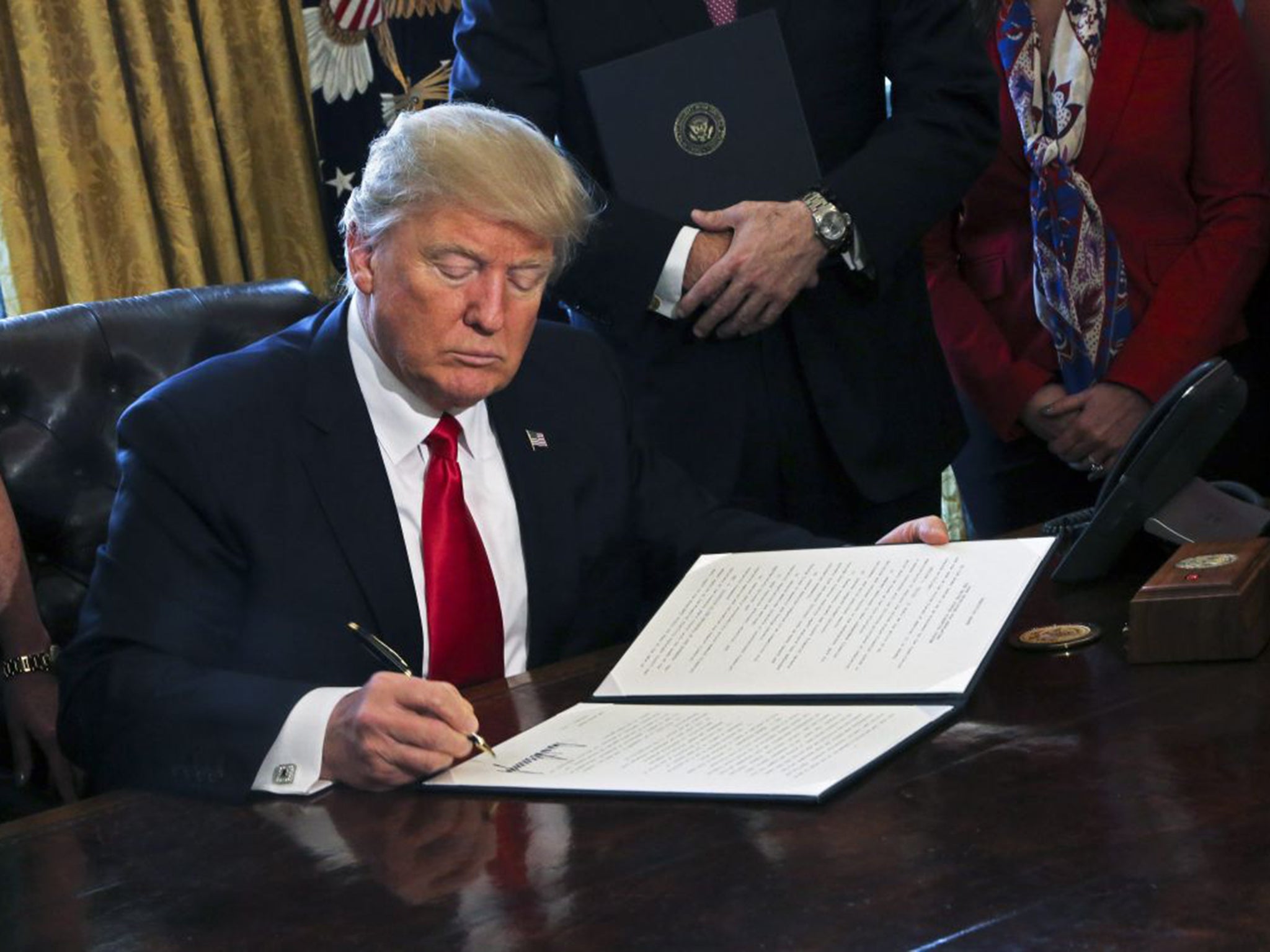Donald Trump moves to roll back Obama-era financial regulations that curbed banks and protected consumers after credit crisis
US President says he plans to repeal much of the Dodd Frank Act of 2010, a law designed to prevent another meltdown, because his ‘friends’ cannot get loans

Your support helps us to tell the story
From reproductive rights to climate change to Big Tech, The Independent is on the ground when the story is developing. Whether it's investigating the financials of Elon Musk's pro-Trump PAC or producing our latest documentary, 'The A Word', which shines a light on the American women fighting for reproductive rights, we know how important it is to parse out the facts from the messaging.
At such a critical moment in US history, we need reporters on the ground. Your donation allows us to keep sending journalists to speak to both sides of the story.
The Independent is trusted by Americans across the entire political spectrum. And unlike many other quality news outlets, we choose not to lock Americans out of our reporting and analysis with paywalls. We believe quality journalism should be available to everyone, paid for by those who can afford it.
Your support makes all the difference.Donald Trump has signed another two executive orders to review and roll back financial industry regulations which were imposed by former President Barack Obama after the financial crisis.
"Today we’re assigning core principles for regulating the United States’ financial system," the President said to reporters, seated at his desk in the Oval Office.
"It doesn’t get much bigger than that, right?"
With one swoop of his pen, Mr Trump ordered a review of a cornerstone of Barack Obama’s legacy, a law that sought to curb Wall Street's loans and risk-taking – activities which arguably led up to and exacerbated the 2008 credit crisis.
The Dodd-Frank Act was signed in 2010 and was seen as a government stamp-down on banks after the administration was forced into a multi-billion dollar bailout to save the economy. Critics accused the former President of not going far enough to punish banks after the global economy tanked, penalising homeowners and causing a great recession.
The Act will not be changed overnight; rather Mr Trump has solicited advice from the heads of regulatory agencies as to how the law should be changed.
Mr Trump justified the move to reporters during a meeting with CEOs of large corporations, saying his friends in the business world had been affected by the law.
"We expect to be cutting a lot out of Dodd-Frank because, frankly, I have so many people, friends of mine, who have nice businesses who can’t borrow money," he said, sitting near to Jamie Dimon of JPMorgan Chase and Stephen Schwarzman of the Blackstone Group.
"They just can’t get any money because the banks just won’t let them borrow, because of the rules and regulations in Dodd-Frank."
He has previously called the Act a "disaster" and pledged to "do a big number on it".
He will also delay an Obama-era Fiduciary Rule that would have required investment and financial advisers to act on their clients’ best interests as opposed to being motivated by commission. The rule was supposed to be implemented in April.
A Trump administration official, however, said it was a “complete mess” and would limit options for end customers, as well as making independent advice more expensive.
The Labour Department will have 90 days to review the Fiduciary Rule and will have the final word as to whether to enact it. The new head of that department, Andy Puzder, was the former head of a restaurant chain and has been described as the “sworn foe” of the minimum wage, paid leave and sick pay.
Mr Trump’s pandering to Wall Street and big business interests could be described as hypocritical given he accused his former rival for the White House, Hillary Clinton, of being beholden to the big banks and making $675,000 (£540,500)from paid speeches to Goldman Sachs.
His appointee to direct the national economic council was Gary Cohn, former president and COO of Goldman Sachs. Mr Cohn was forced to apologise to the senate after the crisis, explaining his bank had pushed to build up risk-taking and its mortgage business and lost around $5bn (£4bn).
Mr Trump came under fire during the presidential campaign for admitting that he had been rooting for the housing crisis, because as a real estate developer he could take advantages of buying property at depressed prices and make a profit.
Subscribe to Independent Premium to bookmark this article
Want to bookmark your favourite articles and stories to read or reference later? Start your Independent Premium subscription today.
Join our commenting forum
Join thought-provoking conversations, follow other Independent readers and see their replies
Comments